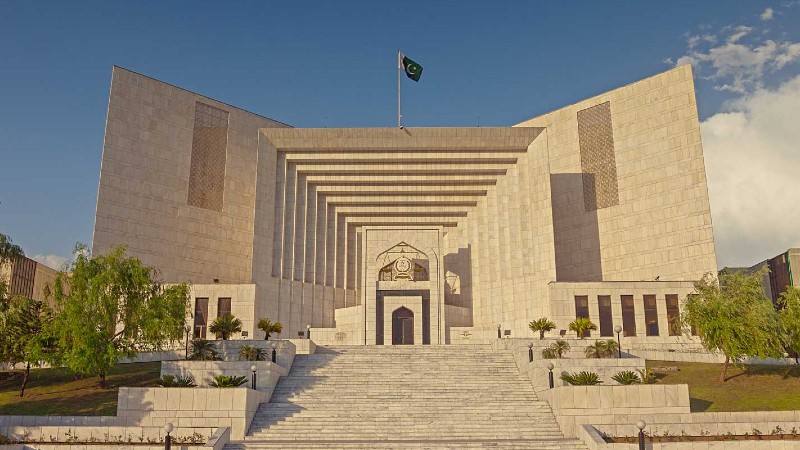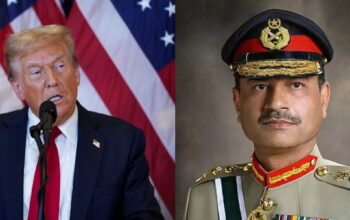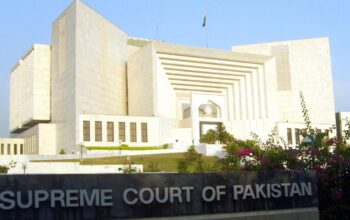Justice Mansoor Ali Shah questions the locus standi of Imran Khan to file petition against amendments in NAB law after walking out of the National Assembly.
By Naveed Naqvi
ISLAMABAD: Chief Justice of Pakistan (CJP) Justice Umar Ata Bandial said Friday elections too are a form of accountability, as voters get to hold their representatives accountable at the ballot.
He was presiding over a 3-member bench of the Supreme Court of Pakistan (SCP) hearing a petition from former Prime Minister Imran Khan against the recent amendments to National Accountability Bureau (NAB) law by the Pakistan Democratic Front (PDM) government.
Today’s hearing was the first time senior lawyer Makhdoom Ali Khan represented the federal government in the case. Khan was represented by Khawaja Haris as before.
The CJP also said some of the amendments made in NAB laws by the PDM government were actually good. He noted how NAB law had been abused to arrest people for owning one or two plots in small housing societies.
Justice Bandial noted how NAB had acted as an instrument of persecution in many cases. He also seemed preoccupied with the negative impact of NAB proceedings on economy.
However, he was askance if the amendments in question effected fair trial and due process in a way to render prosecution unable to prove its case.
Justice Bandial was askance if a case of accumulation of assets beyond known source of income was necessary for accountability.
Khan’s counsel Khawaja Haris opened his arguments maintaining the present amendments in question were in violation of constitutional mandate.
He said the court could nullify even constitutional amendments if found contrary to the basic structure of the Constitution.
Khawaja Haris maintained that the SCP had declared good governance a basic right in a prior judgement.
He argued that accountability was must for good governance, adding there could be no concept of good governance without accountability.
Another argument he brought was that some pending cases would become ineffective due to NAB amendments. He also said cases of misuse of powers and assets beyond means have been abolished due to NAB law amendments.
The counsel for Imran Khan informed the court some more amendments had been made in NAB laws a day before. He said a draft of the new amendments had been filed in the court, and his client stood ready to challenge the new amendments when they became law.
He argued that NAB was an important respondent in the matter and should therefore be represented at the hearing.
Justice Mansoor Ali Shah raised a question as to the locus standi and credibility of the petitioner to file petition against amendments in NAB law after walking out of the National Assembly, which was the appropriate forum to resist these amendments.
He also enquired if Khan had he consulted the people of his constituency before quitting the Lower House of Parliament.
Khawaja Haris said elected representatives tendered resignations under political strategy.
Justice Shah further said independent judiciary was included in basic structure of the Constitution, and the court would have to see what power of judiciary has been abolished due to NAB amendments.
He also remarked the petition would have to be amended to challenge new amendments introduced to the NAB law by PDM government.
Mansoor Ali Khan took the plea that new amendments had not become part of law so far, so he could not give any view until the new amendments were made law. He nevertheless he would file his reply if the court ordered him to.
Justice Ijaz ul Ahsan raised the question if accountability was part of parliamentary democracy. He noted that the petitioner’s counsel was of the view that the powers of accountability had been curtailed due to the NAB law amendments.
He also noted that the amendments, introduced in 2022, were to take effect from 1985, and argued that if they are implemented retrospectively, sentences passed earlier would be abolished and the penalties would be overturned.
Justice Ahsan was askance if Parliament could legislate to afford benefit to specific persons. He asserted that if corruption had taken place on public money, it amounted to a violation of basic rights and would therefore fall within the court’s jurisdiction.
The court adjourned the hearing of the case till August 19, seeking reply from NAB on the amendments.
Copyright © 2021 Independent Pakistan | All rights reserved




